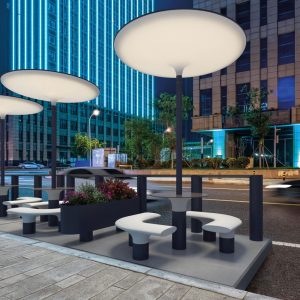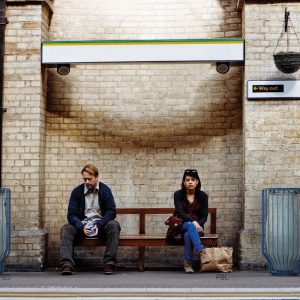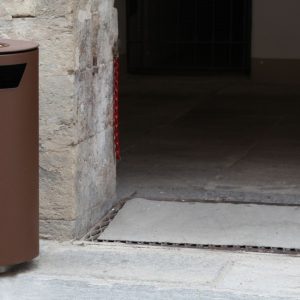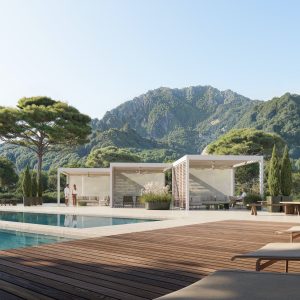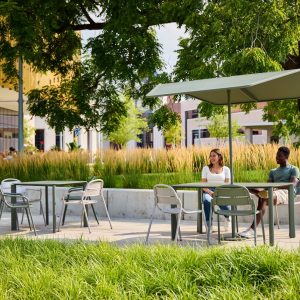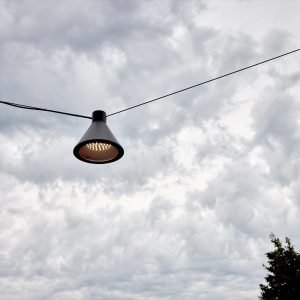Featured
How to Not Build: Tempelhofer Feld
The famous Bartleby quote: “I would prefer not to”, is often the paradoxical silent monologue of a professional working in development. You need the job but you don’t always believe the project’s brief is fully justified, in line with the values and needs of users, sometimes even feels forced to produce revenue which can put […]
+
Deep Landscape
What do we actually know about the ground on which we stand, and how does it relate to our landscape projects Interventions on the surface of the landscape affect the underground as much as they are conditioned by it. Many processes pass through the grade of the ground, relating to water, energy, ecology and vegetation, with trees bridging above- and below grade. Organic matter is created in the ground, carbon is captured and stored there, and it is the habitat of various species. If we, as landscape architects, aim to incorporate ecology and hydrology into project development, the design phase must incorporate a thinking of above- and below grade as one.
+
The Dutch Landscape by Alexandra Tišma & Han Lörzing
The Dutch Landscape, The Ultimate Guide for Study, Professional and Personal Use by Alexandra Tišma[1] and Han Lörzing[2] is a “text-book” and a thorough yet very accessible guide on landscapes in the Netherlands – described from many angles and scales, historical, geographical, geological and biotic layers, cultural landscapes, from development, and planning to conservation – […]
+
Art Rethinking Nature: Giovanni Aloi
Giovanni Aloi is an author, curator, and creator with a PhD from Goldsmiths University, focusing on natural history in art representation. His work examines depictions of flora and fauna to uncover societal values and foster shifts in these through critical reflection. Through publishing, curating exhibitions, delivering talks, and editing Antennae: The Journal of Nature in […]
+
Shaping Discourse: Reflections on the ISUP Symposium and the Value of Professional Symposia
The 4th Symposium of the Istituto di Studi Urbani e del Paesaggio (ISUP), titled Landscape As Architecture, took place in Mendrisio, Switzerland, from November 13 to 15, 2024. Previous editions in the series explored themes of Climate Urbanism, Scale, and Density. Out of over 250 submissions, the curators, Jonathan Sergison, João Nunes, and João Gomes […]
+
Landscapism in Nature Conservation
Dr. Jevgeniy Bluwstein, a Senior Research Fellow in the Department of Social Anthropology and Cultural Studies at the University of Bern, examines how the reductive Western view of landscapes reinforces colonization through exclusionary conservation practices, focusing on a case study of Tarangire National Park in Tanzania. Introducing the term “landscapism,” meaning the “double movement of colonizing landscapes/landscaping colonies,” Bluwstein offers a critical perspective, advocating for viewing landscapes through a lens of relationality.
+
(Co)Designing Hope: Aqueous Landscapes in Transition by Laura Cipriani
Laura Cipriani is an assistant professor of landscape architecture at Delft University of Technology and a founder of Superlandscape, a landscape and urban design firm. She holds a Ph.D. in Landscape Urbanism from IUAV, a master’s degree in landscape and urban issues from Harvard Design School, and a master’s in Architecture from IUAV. Her current […]
+
Designing for People (With Bad Intentions)
The boulevard of Nice, a Christmas market in Berlin or the headquarters of a Dutch newspaper – the past decade has seen a rising number of attacks with a vehicle as a weapon. Following these attacks, city officials started to look differently at their public space. How do we keep our public spaces safe and […]
+
Charged Landscapes – Nuclear Chronicles by Andrew Madl
The Nuclear Chronicles: Design Research on the Landscapes of the U.S. Nuclear Highway by Andrew Madl is an exploration of unrealized U.S. government nuclear proposals and their speculative impact on the western landscape. Through fictional narratives in a graphic novel format, the book imagines cultural and ecological shifts, illustrating infrastructures and economies that might emerge […]
+
Liam Young: Half-Earth-Planet-City
Planet City is a worldbuilding project by Liam Young, envisioned as a multilayered city, occupying as little as 0,02 percent of Earth’s surface yet hosting all of the human population. Planet City is testing the Half-Earth idea by Edward O. Wilson, where we put aside half of the planet, to keep biodiversity. We spoke with Liam Young about the idea and the exhibition he curates, Visions of Planet City.
+
Wild Playgrounds
Almost every park needs a playground area and children’s playgrounds are one of the toughest typologies to design. The equipment available is either ugly or beyond budget, especially in the public realm. Then the programme is repetitive — poles, slides, swings, climbing walls, sandpits. For the designer to cover the developmental needs of all ages […]
+
Lausanne Jardins 2024
Rhys Williams is the program director for landscape architecture at the University of Technology Sydney. Rhys visited the experimental garden festival in Switzerland, Lausanne Jardins. Here is his take on the context and a selection of exhibited projects.
+
The Harm of Harmonising
As we confront the growing ecological crisis, it becomes increasingly difficult to argue that harmonious aesthetics, designed primarily for pleasure and ease, are always the most effective mode of expression. Perhaps there is space to question whether ecological efforts demand a different aesthetic attitude, one less fixated on traditional notions of balance and spatial conformity and more open to dissensus and confrontation.
+
Sara Eichner: On Public, and Data through Design
Sara Eichner is a visual artist and designer with a keen interest in data visualisations and cartography. She works with Geographic Information Systems (GIS) and programming languages like Python and uses design software to translate data into comprehensible visual stories. Her work is people-centred and she often uses data to represent less-heard voices. Eichner is […]
+
Can the Right to Landscape Bridge Socio-Environmental Challenges?
In the current debate about climate change and its disruptive effects on the health of people and ecosystems, the reclamation of the ‘right to the environment’ has gained momentum, both in theoretical accounts and in legal documents. Yet, it is useful to make a first distinction between the right to the environment and the right of the environment.
+
Gary Hilderbrand: “The World Is Too Cacophonous, and I Think It’s in Our Power to Calm a Place”
Gary Hilderbrand has been teaching at Harvard Graduate School of Design since 1990 and is currently the Peter Louis Hornbeck Professor in Practice and Chair of the Department of Landscape Architecture. He is also the founding principal of Reed Hilderbrand, a leading landscape architecture firm based in Cambridge, Massachusetts. The firm was established in the […]
+
Under the Bridge
Bridges allow the landscape to flow underneath – or as in recent endeavours, in land bridges or ecoducts, nature flows over. In the latter, a bridge adjoins disconnected landscape portions created by cuts in the terrain. In any case, bridges form connections and links when a river or other barrier needs to be crossed. As […]
+
On Trees and Beasts, or How Ideas of Nature Shape Our Spaces
“Excerpts from a project on Trees and Beasts” Denise Hoffman Brandt© Denise Hoffman What do we actually mean when we talk about nature? As a professor in a discipline that since the early 1970s has, mostly, claimed to practice “design with nature”—referencing Ian McHarg’s book (1969) of that title—that’s a question I have often asked. […]
+
Denise Hoffman Brandt: On Ethics and Design with Nature — Debunking Ian McHarg
In the conversation with the landscape architecture professor, artist and writer Denise Hoffman Brandt*, we speak about the morality issues attached to “doing good” while debunking Ian McHarg’s problematic position in Design with Nature. In the conversation, Brandt points out how our assumptions about nature shape our actions, why stewardship is problematic and what landscape […]
+
LILA 2024 Recognitions Announced!
Members of the LILA 2024 Jury, Catherine Mosbach, Joost Emmerik, Lilli Lička, Lisa Diedrich, and Zaš Brezar selected projects for the 9th edition of LILA. Editors of Landezine selected the LILA Honour Award, LILA Office Award and LILA Portfolio Award. Landezine congratulates all the recognized practices and thanks the members of the jury, all participants […]
+
Lydia Kallipoliti: Histories of Ecological Design, an Unfinished Cyclopedia
In the talk, Lydia Kallipoliti* – #architect #educator #researcher #thinker – presents her newly published book Histories of Ecological Design: An Unfinished Cyclopedia, followed by a Q&A where we talk about the intentions of writing the book, about how the “waste speaks of the incomplete perception of the World”, the psychological profile of ecological designers […]
+
Dan Kiley Exhibition – Interview with Charles Birnbaum, TCLF
Charles Birnbaum is the CEO and founder of TCLF—The Cultural Landscape Foundation. In his work, he is a fearless advocate and activist for significant American landscape architecture sites. He was honored as a 2020 LILA Honour Award Winner for initiating and developing TCLF for over 25 years with an “innovative vision, executed with great precision, […]
+
Palimpsestous Landscapes: Post-Industrial Parks
A post-industrial park is typically a sexy landmark, easy to make a story of, photogenic, and a palimpsest in itself. It presents a victory of public use over the private and industrial by opening previously closed-off spaces. A post-industrial park offers some crucial topics of remediation, adaptive reuse, and social integration, among others. For a […]
+
Circles, Disks and Rings
Observed as a recurring phenomenon in nature and universally interpreted, the circle stands as a fundamental geometric shape. It symbolizes various concepts such as infinity and unity, among others. In constructed environments, the focal or central point of a circle can be represented by a tree as the axis mundi, a fire pit or an […]
+
The Novel City: Faux Nature Maze
When we speak of Nature in cities, the question we want to stress is, is nature in cities natural or in fact an artefact? When we speak of natural processes, they of course take place but apart from spontaneous nature, left to random succession, emerging in spaces that Gilles Clément calls the third landscapes, there […]
+
HPO: On Temporary and Incomplete
HPO is an art and event-architecture group from Ferrara. Their work has been, among other venues, presented at Milan Design Week and 18. Venice Biennale.
In the interview, we discuss the marginal position, DIY, incomplete architecture and the importance of play.
+
Observatorium: Public Art for Public Spaces
Landezine talks to Andre Dekker, who, together with Ruud Reutelingsperger, Lieven Poutsma and Geert van de Camp, forms a public art collective Observatorium. In the video, Dekker gives a 30-minute-long presentation of some of Observatorium’s most recent and most important works. Their artworks traverse the realms of urban planning, landscape design, architectural innovation, and artistic […]
+
Tim Waterman On Astronauts, LSD and Landscape Architecture / Lecture + Q&A
Tim Waterman is Professor of Landscape Theory and Inter-Programme Collaboration Director at the Bartlett School of Architecture, UCL. He is Chair of the Landscape Research Group (LRG), a Non-Executive Director of the digital arts collective Furtherfield, and an advisor to the Centre for Landscape Democracy at the Norwegian University of Life Sciences. He is also […]
+
Lisa Diedrich on Aesthetics of the Transitory and Operating As a Radicant
In this interview, Zaš Brezar talks to Prof. Dr. Lisa Diedrich, the winner of LILA 2023 Honour Award. She speaks about her professional development throughout the years and specifically about being a ‘straddler’ between professional practice and academia. She references several books and projects that inspire her as a landscape architect, architect, journalist and especially […]
+
Taktyk: “Landscape Architecture is Not Enough”
Landezine met with Taktyk at the XII Barcelona International Landscape Biennial in November 2023, at the same place where we made the first interview, seven years ago. Taktyk’s work is a collage of collaborations showing sensitivity to the site, tackling its most vulnerable spots. Sébastien Penfornis and Thierry Kandjee seek through prospective visions, on-site works […]
+
Strategies Against Sameness #2
We continue with French philosopher Michel Foucault. In his 1967 speech to an architecture audience, he introduced the concept of “heterotopia”. It was published in 1984 as an essay, Des Espaces Autres (Of Other Spaces), and it deals with the nature of space and its relation to society. Heterotopias are unique spatial entities that challenge conventional notions of space and compel reflection on the social, cultural, and ideological matters of our world.
+
Günther Vogt: “Ecology is Invisible”
Günther Vogt probably needs no introduction in our profession; he has been an important practitioner for a couple of decades now, appreciated globally for his rich, non-linear and adventurous design approach. Initially, his education was more in the direction of botany. He later shifted to landscape architecture by studying in Rapperswil, Switzerland. After his study […]
+
Let’s Talk About Sustainability.
Today’s most urgent topic for all professional groups everywhere must be how to give our planet and its inhabitants possibilities to survive. Never before has the professional field of landscape architects shifted its goals so quickly, as we have seen only over the last few years. The focus for landscape architecture nowadays is clearly sustainability. […]
+
Betania Garden – Rich and Detailed Composition With Minimum Amount of Moves
Sarah Cowles of Ruderal presents their design for the Betania Garden near Tbilisi, Georgia, which was awarded LILA 2023 Special Mention in the Garden category. We start the discussion with an update on Arsenal Oasis, another LILA-winning project from 2021 (See the presentation). For the Betania Garden, the LILA 2023 jury wrote: At first glance, […]
+
Strategies Against Sameness #1
The production of landscape architecture projects has been in recent years outstanding, and our entire professional community has much to be proud of. But as always, there is a flip side; like in architecture or any design discipline of the globalised and speeding-up world, we are faced with a sea of sameness. Too many buildings […]
+
Claude Cormier, 1960 – 2023
It is with sadness that we learned about the passing of renowned Canadian landscape architect Claude Cormier. In 1995, he established Claude Cormier Architectes Paysagistes in Montreal and, in nearly three decades, received a plethora of awards for his work, both in Canada and internationally. At Landezine, we featured a selection of projects by his […]
+
The Cute, the Bad and the Ugly – On Urban Biodiversity and Ecological Aesthetics
Urban biodiversity? Yes, please! Nevertheless … … Due to the transitional phase of our understanding of nature in the light of the Anthropocene, there are still some important notions, contradictions and misunderstandings that need to be addressed. To do so, we will operate with terms like nature, ecology, biodiversity, landscape, and aesthetics, and we’ll focus […]
+
The Paradigm Shift and Spaces of Meaning
»Paradigm shift« has been, for at least a decade now, one of the most used phrases in landscape architecture. We use it mainly to address the need to focus on design with natural processes in mind. This is important as it concerns our core values, attitude towards nature, the understanding of natural processes and the […]
+
Artificial Intelligence, Generative Design and Landscape Architecture
The AI services embedded in tools for creative profiles are developing so rapidly that this article will definitely be outdated by 6 pm tomorrow. Last year we featured a piece on Midjourney and similar platforms, and it already reads like Grandpas discussing ‘the internets’ back in the 90s. I suppose enchantment by civilisation’s technological advances […]
+
LILA Honour Award 2022: Gilles Clément
We are thrilled to share with you the interview with LILA 2022 Honour Award winner Gilles Clément. The interview was conducted in Paris in November 2022 by Zaš Brezar and Joost Emmerik. The editors wrote in the award statement: Gilles Clément (1943) is a French landscape architect or better ‘paysagiste’, having a more garden design-related […]
+
Winners of Streetlife Design Competition Announced!
We are delighted to let you know that the competition Streetlife organized together with Landezine reached its grand finale this past weekend! Nearly 200 guests and participants gathered in a beautiful Hooglandse Church in Leiden, Netherlands. The 12 finalist teams presented their projects, and the six recognitions were announced. See the winning projects on streetlifedesigncompetition.com […]
+
Second Glance – 6th LAE Landscape Architecture Europe edition: Prof. Dr. Lisa Babette Diedrich
We are focusing on one of the most influential landscape architecture platforms; LAE – Landscape Architecture Europe. For nearly 20 years, the triennial book has been bringing a complex multilayered reflection on the most interesting recent European projects. Prof. Dr. Dipl. -Ing. Lisa Diedrich presents the last edition titled Second Glance. She also presents the editorial […]
+
Léon van Geest, Rotterdam Rooftop Days
Rotterdam Rooftop Days (Rotterdamse Dakendagen) is an annual festival that promotes rooftop living and emphasises the potential of roofs in mitigating issues of public space, empowering communities, reducing urban heat, increasing urban biodiversity, urban food production etc. It features Knowledge Day, Rotterdam Rooftop Walk, various cultural events and, most importantly, establishes a network of permanently […]
+
Using Artificial Intelligence In Your Design Process
Zaš Brezar on AI and the design process in the landscape architecture profession.
+
Dr. Stephan Brenneisen: Living Roofs – Biodiversity and Water Retention by Design Measures
Dr. Stephan Brenneisen from the Zurich University of Applied Sciences has been researching urban biodiversity and roofs for over 25 years. In a video presentation, he talks about his findings. We asked him specifically to speak about what to keep in mind when designing biodiverse roofs. What can landscape architects learn from his extensive experience, […]
+
The Enchanting Secrecy and Liberating Uselessness of Roofs
In this essay, Zaš Brezar writes about the role of urban roofs in our collective memory. Illustrating the meaning of roofs through a selection of cultural references from films and music. The article is a part of Living Roofs focus on Landezine that is going on in October and November 2022.
+
Interview with Jenny Osuldsen of Snøhetta, LILA 2021 Honour Award winner
Jenny Osuldsen is one of the directors at Snøhetta, a multidisciplinary office that works between architecture, landscape and graphic design. The LILA Honour Award 2021 celebrates Snøhetta for its trans-disciplinary approach to the design process and, specifically, the ability to merge thinking about landscape and architecture. The results are often precious urban moments that host […]
+
LILA 2021: Estudio Ome Present Their Winning Forest Garden
Susana Rojas Saviñón and Hortense Blanchard are the driving forces behind Estudio Ome, a young 5-member landscape architecture practice based out of Mexico City. Their first realized project Forest Garden immediately received LILA in the garden category. Besides that, we could easily say that Ome is LILA’s young-talent discovery of 2021. We really look forward […]
